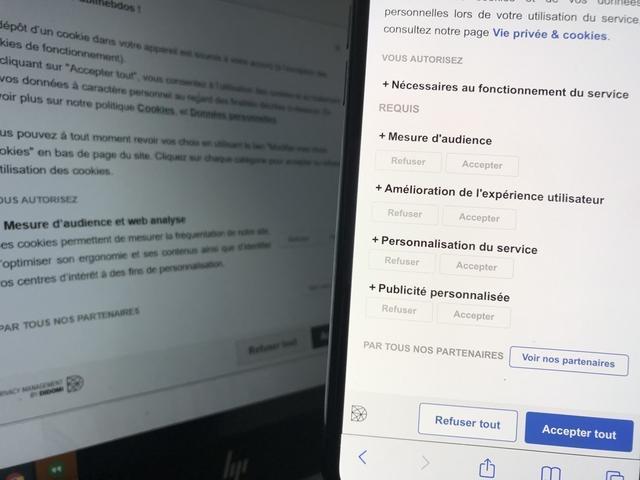Tired of car advertisements because you visited a used vehicle sales site? Or clothes ads because you ordered online? And tired of having to read all the privacy settings when you arrive on a site, without necessarily understanding everything?
From 1st April, the rules surrounding cookies on websites are changing. And all French sites will have to comply with it, in order to better protect the personal data of Internet users.
What are we talking about cookies?
On the internet, users are regularly asked to accept or refuse cookies. A choice that Internet users make, sometimes without really measuring what it entails.
Cookies are “computer files stored on a server in the Internet user’s computer, they make it possible to collect his browsing data”, explains the CNIL (National Commission for Computing and Liberties).
"They allow a company to keep track of an Internet user's browsing," adds Grégoire Hanquier, legal, compliance and public affairs director at Data Legal Drive, which specializes in compliance with the General Data Protection Regulation. data protection (GDPR).
Some of these files are essential because they participate in the proper functioning of the site, or even practical, to memorize display preferences in your browser or a shopping cart for example, until payment of the order.
Others, on the other hand, are only used to “collect information on the Internet user in order to send him personalized advertising, adapted to his tastes and his centers of interest”.
New rules for more control of Internet users

Also, to give Internet users more control over the use of their data for advertising purposes, the CNIL has changed the rules for the use of cookies.
Thus, on April 1st, here is what changes for the Internet user when he arrives on a site:
• If he wants to refuse cookies: he must be able to do so easily with a very visible “refuse all” button, at the same level and with the same appearance as the “accept all” button. Today, to accept them, all you need is a click on a button, whereas "several actions are necessary to set up a refusal", explains the regulatory authority, which judged that there was "a risk that the Internet user, who generally wishes to quickly access the site, is influenced.
• If he gives his consent for the tracers: the Internet user must be able to find quickly and in a "clear and concise" manner all the information relating to the data that will be collected and what they will be used for (personalized advertising or not, advertising geolocated, personalization of content or sharing of information with social networks), before accepting them. The Internet user must also be able to withdraw his consent quickly, at any time.
The CNIL starts from a principle: “For your consent to be valid, it must be informed. »
• Consent required: this was not the case until now. From now on, if the Internet user does not validate or refuse the cookies, the latter must not be deposited on the device. This now requires explicit consent. "No cookie that is not essential to the operation of the site can be placed on your computer, telephone or tablet if you have not explicitly accepted it by an action", explains the CNIL in a video, as indicated in its new document. reference.
Note that some tracers are still exempt from obtaining consent: "Tracers intended for authentication with a service, those intended to store the contents of a shopping cart on a merchant site, certain tracers aimed at generating traffic statistics, or even those allowing paying sites to limit free access to a sample of content requested by users. »
On the other hand, no ban on “cookie walls”, a practice which consists of blocking access to a website in the event of refusal of cookies. The Council of State rejected last June this ban that the CNIL wanted.
What are the consequences for site publishers who do not respect the rules?
Site publishers had six months to organize themselves. The independent authority ensures that control missions will now be carried out from April 1. With a risk of sanction in the event of breach of these obligations.
“There are two possible sanctions, explains Grégoire Hanquier: a sanction of up to 4% of global turnover and a public sanction, which can give the publisher a bad media image. »
In addition to a certain "loss of information" for the latter, he acknowledges, there is also the fear of a loss of earnings when digital advertising today represents "a huge business".
For the legal director, it is also an issue of information and transparency for the Internet user. For the CNIL, it is a question of meeting “the expectations of Internet users who are increasingly sensitive to the problems of tracing on the Internet, as evidenced by the constant complaints it receives on this subject”.
To answer the questions of site editors and Internet users, the independent authority provides an online FAQ.
Was this article useful to you? Note that you can follow Actu in the My Actu space. In one click, after registration, you will find all the news of your favorite cities and brands.
Share
News See my news









Farewell Touch Bar, I won't regret...
Caddy, the only web server to use H...
Burkina Faso / Gabon (TV / Streamin...
What the future of work will not b...